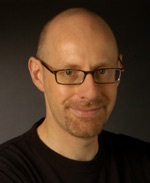
Op thebrowser.com stond een paar dagen geleden een interessant interview met de skepticus Richard Wiseman. Het ging over zijn boeken top-5. Het hoeft niet te verbazen dat hij 5 klassieke skeptische boeken heeft uitgekozen.
In het begin van het interview vertelt Wiseman over zijn motivatie: ‘I think it’s enormously important to be sceptical, particularly in psychology because we’re very good at leading ourselves astray’. De relevantie van skepticisme is nog steeds groot. Wiseman wil met zijn onderzoek en boeken oproepen om eerst na te denken voordat je paranormale overtuigingen omarmt:
‘” … at least give it [kritisch denken] a try before you decide this stuff definitely exists.” I think that’s really important, because certainly when it comes to psychics and mediums people allow them to have a massive influence over their lives’.
De interviewer vraagt of het geloof in het paranormale afneemt in ‘the era of modern science’. Wiseman:
‘It would be nice if that were the case. If anything it looks the opposite way round. As science and technology grow, so too does belief in the paranormal. At the moment in the UK around 50% of people believe in some sort of paranormal phenomenon. In the US it’s about 80 or 90%. So it’s a massive industry. And unfortunately, science isn’t getting rid of it’.
Zo weten we waar we staan.
En nu zijn boeken top-5. In het interview wordt uitvoerig stilgestaan bij ieder boek, hier de highlights.
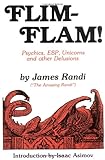 Flim-flam van James Randi. Wiseman:
Flim-flam van James Randi. Wiseman:
Flim-Flam! had a huge impact on me when I first came across it, because it was the first time I’d seen a whole volume which wasn’t taking any nonsense, which wasn’t saying “maybe this stuff is true”. It’s a hardline approach that looks at a whole range of issues. … What impressed me was that he got out into the field, he did the research, and it wasn’t a “maybe some of this stuff is true” approach. He was simply saying, “None of it is true and here’s what’s really going on.”

The Psychology of Superstition van Gustav Jahoda. Wiseman:
‘It’s a great book. It’s fairly old now, but a readable introduction to a psychological take on the whole of the paranormal. … Jahoda looks at our own everyday psychology. Why is it that we touch wood and cross our fingers? Why are we superstitious thinkers? It’s a very early but very important treatise on that topic’.
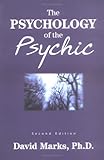
The Psychology of the Psychic van David Marks. Wiseman:
‘The Psychology of the Psychic, along with Flim-Flam! was one of the first sceptical books that I came across. David is a very good psychologist and his is a more detailed approach, focusing on parapsychological research – laboratory based research into ESP – and really dismantling some of those experiments. He said, this is what you’ll read in the journals and newspapers but this is what’s actually going on’.
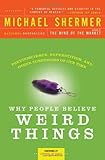
Why People Believe Weird Things van Michael Shermer. Wiseman:
‘This is a more recent book. He takes a wider perspective on the paranormal, looking at UFOs and conspiracies. His argument is that we’re very good at finding patterns – that’s one of the reasons why science has been so successful – but sometimes that mechanism goes into overdrive. If you take something like finding a face in the environment, the brain would rather see a few faces that aren’t there than not see one that is. So you can look into the darkness of the bushes and see a face that isn’t there, and convince yourself that it’s a spirit or ghost’.
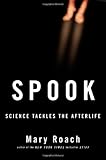 Spook van Mary Roach. Wiseman:
Spook van Mary Roach. Wiseman:
‘I like Mary Roach as an author, she makes me laugh. What I like about Spook is that it’s a rather fun, light-hearted tour through all the weirdness that researchers have tried to examine. She talks about near-death experiences, seances, experiments where they weighed dying animals in order to weigh the soul as it left the body. All these strange experiences are the kind of quirky psychology which I love. The psychology of the field is quirky too. It is a deeply weird field populated by deeply weird people’.
Deze boeken zijn deels verkrijgbaar via bol.com (zie hieronder). In het aangehaalde artikel vind je ook links naar bestelmogelijkheden. Koop je via de links hieronder, dan steun je Kloptdatwel.
De foto op de voorzijde: foto van Antje M. Pohsegger via richardwiseman.com.

Iedereen zal zo zijn eigen lijstjes hebben. Ik vind het moeilijk om een top aan te geven. Ik laat handboeken en encyclopedieën buiten beschouwing, en ook bundels van eerder verschenen columns en essays. Ik let wel op breedte van onderwerpen. Mijn nogal willekeurige lijstje is dan in volgorde van verschijning:
1. Charles Mackay, Memoirs of Extraordinary Popular Delusions And the Madness of Crowds (1841, 1852). Is later nog herdrukt.
2. Martin Gardner, Fads and Fallacies In the Name of Science (1952, 1957). Wat mij betreft het oervoorbeeld van een ‘sceptisch boek’.
3. D.H. Rawcliffe, Occult and Supernatural Phenomena (1952). Herhaalde malen herdukt onder andere titels.
4. Terence Hines, Pseudoscience and the Paranormal (1988). Er is een second edition van 2003, maar ik weet niet in welke mate die aangevuld of verbeterd is.
Vooral nummers 2 en 4 hebben grote indruk op mij gemaakt.
Dan drie meer specialistische boeken, met veel plaatjes:
Ted Schultz (ed.), The Fringes of Reason, A Field Guide to New Age Frontiers, Unusual Beliefs and Eccentric Sciences (1989). Eigenlijk grotendeels een collectie van eerder verschenen artikelen uit Whole Earth Review met encyclopedische pretenties.
David Armstrong and Elizabeth Metzger Armstrong, The Great American Medicine Show, Being An Illustteted History Of Hucksters, Healers, Health Evangelists and Heroes From Plymouth Rock to the Present (1991).
Donna Cossy, Kooks: A Guide to the Outer Limits of Human Belief (1994).
Voor als je denkt dat je alle gekkigheid wel gezien hebt. Er is nog een tweede uitgebreidere versie van 2001. Cossy is een specialist in kookology.
Laten we de producten van Nederlandse bodem niet vergeten, bijvoorbeeld “Helderziendheid bekeken” van Dr. H. G. Boerenkamp.
Zie : http://www.skepsis.nl/blog/2007/12/helderziendheid-bekeken-gratis-boek/
En, aangezien de heren Nanninga en Nienhuys uiteraard bescheiden zijn op een site van Skepsis :
– “Parariteiten” van Rob Nanninga, 1988 (tot mijn schande nog niet gelezen) en
– “Tussen waarheid en waanzin” van Marcel Hulspas en Jan Willem Nienhuys, 1997, een ware encyclopedie waar ik in de loop der tijden veel informatie heb uitgehaald.
Mogen wij nog eens een nieuwe publicatie verwachten van de heren Nanninga en/of Nienhuys ?
Wisemans lijstje bevat voornamelijk boeken over psychologische zaken of boeken van andere psychologen.
Het door Jan Willem genoemde boek van Martin Gardner “Fads and Fallacies in the Name of Science” is iets algemener. Ik las het aan het eind van de 70er jaren toen ik eerstejaars student was. In dat boek worden zo’n 20 pseudowetenschappelijke bewegingen behandeld. Scientology, telepathie, natuurgeneeswijze, etc. – allemaal hebben ze een eigen hoofdstuk van zo’n 15 pagina’s. De toon en stijl lijken erg op die in een modern skeptisch tijdschrift als “Skepter.” De grondgedachten, geschiedenis en praktijken van een beweging worden beschreven. Er wordt uitgelegd waarom het onzinnig is en er zijn amusante “human interest” verhalen over de charlatanerie. Het leest vrij vlot.
Het was geschreven in de jaren 50. Voor zover ik weet was het het eerste boek in z’n soort en heeft het echt school gemaakt.
Later schreef ie nog een opvolger: “Science – Good, Bad, and Bogus.” Dat was een verzameling van z’n losse artikelen. Het was droger, taaier en specialistischer.
Ik kreeg voor een verjaardag “Science – Good, Bad and Bogus” van Martin Gardner cadeau. Zo is mijn skepticisme begonnen. Ik ben toen naar een boekenbeurs in Frankfurt gereisd en heb daar bij uitgeverij Prometheus “Flim-Flim”, “The psychology of the psychic”, “ESP and parapsychology” (van Hansel) en een bundel met Skeptical Inquirer artikelen gekocht, want het duurde destijds idioot lang als je die boeken in de VS moest bestellen. Gardner was altijd uitstekend geïnformeerd, zocht dingen goed na en wist het boeiend en ironisch op te schrijven. Hij was genuanceerder dan Randi en zijn informatie was ook betrouwbaarder. Wel iemand om een voorbeeld aan te nemen. Tegenwoordig lees ik liever artikelen, waar meestal meer nieuws in staat dan in boeken.